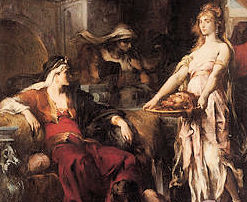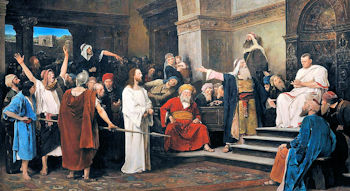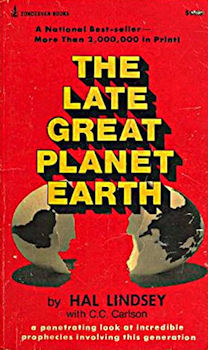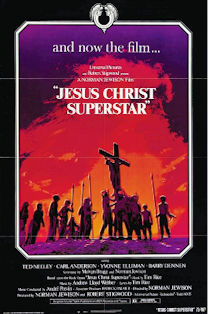This article is going to be a little weird — like me, I guess. We will cover a bit of background concerning the Roman government during New Testament times, but the last half of this discourse, although related, is a personal reflection from early in my adult life. So, let’s get started.
Jesus’ life story is played out under the vast shadow of the Roman Empire. Emperor Caesar Augustus is the earliest government figure that Christian scripture makes reference to, as he was in power during the time of our Savior’s birth (Luke 2:1). He first came to power in 31 BC, after the period of political unrest following the murder of Julius Caesar.1
King Herod the Great (or Herod I) was a leader empowered by the Roman Empire to govern Judea (reigned 37 BC – 4 BC). He was an ample politician and got along well with Israel’s Roman conquerors by having a reputation as someone who could “get things done.” It is questionable that he was a real Jew, but was able to work well with the Jewish religious leaders. Although noted for some good works, such as rebuilding the beautiful Second Temple in Jerusalem, he was also a scoundrel in many ways.2
This Herod was the guy who wanted to murder Jesus. He ordered the murder of all children, two years old and younger, in Bethlehem when he found out that some distinguished travelers had come to visit the rumored new King of the Jews (Matthew 2:1-23). Joseph, Mary, and Jesus retreated to Egypt because of this threat, as prophesied in Jeremiah 31:15. After Herod’s death, they returned, as prophesied in Hosea 11:1.3
Herod had originally arrived in Judea after being commanded, by Mark Antony4 in 37 BC, to go and capture Jerusalem, which he did. His success there set him up as a long running ruler and King of the Jews. After Herod’s death, the Romans divided the kingdom rulership between his sons. One of these, Herod Antipater, became the new ruler of Galilee and Perea, areas where Jesus lived and preached.5
Like Father, Like Son
 Also know as Antipas or King Herod (although never officially having the title of King), Herod Antipater was just as bad as his father — strange relationships within his family, included. After all, he did divorce his first wife and marry Herodias, while she was still married to his brother.6 When the itinerant preacher John the Baptist publically rebuked him about this ungodly marriage, he was arrested then sentenced to death and subsequently beheaded (see: Matthew 14:1-12).
Also know as Antipas or King Herod (although never officially having the title of King), Herod Antipater was just as bad as his father — strange relationships within his family, included. After all, he did divorce his first wife and marry Herodias, while she was still married to his brother.6 When the itinerant preacher John the Baptist publically rebuked him about this ungodly marriage, he was arrested then sentenced to death and subsequently beheaded (see: Matthew 14:1-12).
Later, when told by some Jews that came to Jesus and said “Get away from here, for Herod wants to kill you,” Jesus called him a fox (a cunning person; see Luke 13:31-32), so Jesus had him pegged perfectly and knew how to manipulate him in future events to finish his work on earth, just as he and his father had planned. And Jesus appeared before Herod after his later arrest, too — much about this, later.
Pontius Pilate
Pontius Pilate was a ‘perfect’ or governor of Judea and resided in Caesarea, but frequently went to Jerusalem for business reasons. This job was of a lessor position than that of Herod who oversaw all the territory ‘perfects’ and came to Judea only occasionally. The New Testament treats Pilate as having a weak, vacillating personality. During the angst over Jesus, the Bible treats him differently than other sources of history. One encyclopedia suggests this is because the Bible is preoccupied with the Christians making their way among the Gentiles and eager to avoid giving offense to Roman authorities.7
Not many artifacts survived his presence there, but museums do have a single inscription from Pilate’s governorship (the Pilate stone), as well as some coins he minted.8 An announcement in Israel Exploration Journal9 indicates that a ring has been found which bares the inscription of Pontius Pilate. You can read more about this discovery in a previous article by this author.10
 This man, Pontius Pilate, is best known to Christians, of course, as the man who ordered the trial and crucifixion of Jesus Christ (read the full story in Matthew 26:36 – 27:56). The event is recorded in all four Gospels, but accounts do vary somewhat. Christian texts imply Pilate was rather reluctant to execute Jesus, whereas the historian Josephus, shows him as more condemning.11
This man, Pontius Pilate, is best known to Christians, of course, as the man who ordered the trial and crucifixion of Jesus Christ (read the full story in Matthew 26:36 – 27:56). The event is recorded in all four Gospels, but accounts do vary somewhat. Christian texts imply Pilate was rather reluctant to execute Jesus, whereas the historian Josephus, shows him as more condemning.11
When arrested in Gethsemane, Jesus was taken to Caiaphas, the high priest for one of several legal proceedings. He was there condemned to death. This first trial was under cover of darkness, but since Jewish law required trials to be conducted during the day, the chief priests and elders realized a more official trial was necessary. The next day, he was bound and brought before Pilate (Luke 23:6-12).12
Pilate stated that Jesus was clearly innocent. But not wanting to usurp any supposed authority, he sent him to Herod who happened to be in Jerusalem at that time for the Passover. Arriving at Herod’s location, he was mocked and asked to perform miracles, but Jesus refused the prodding and was then returned to Pilate (this is the event related to my selection of a song for this article).
When back in front of Pilate again, Pilate’s wife sent him a message, “Have nothing to do with that innocent man, for today I have suffered a great deal because of a dream about him.” (Matthew 27:19, NRSV). But even though he tried to persuade the Jewish leaders, they still wanted Jesus killed. Since a riot was beginning, Pilate “washed his hands” of the affair, signifying some half-way “act of absolution”13 and handed over Jesus to be crucified.
More Recent History & Jesus Christ Superstar
My son and I have serious Bible studies and discussions a couple of times a month; it is something which we purposely plan and look forward to. At one such meeting, he brought up the time we had gone to see Jesus Christ Superstar at the movie theater, when he was a little boy. He remembered going but, being just a youngster, he didn’t remember many details. For me, however, this touched-off a flood of memories from the deep recesses in my feeble brain which, eventually, led to me writing this article.
When I was in my later twenties, Jesus Christ Superstar14 was on Broadway15 and the music had already been playing on the radio for a while. The lyrics and rock music were comfortable to me, having just lived through the hippie16 counterculture originating in the United States during the 1960s.
 After already going through my short “I’m an atheist” stage, I had revived my belief in God and read the Bible (somewhat) and had recently finished reading Hal Lindsey’s book, The Late Great Planet Earth.17 The 5th Dimension’s song ‘Aquarius/Let the Sunshine In’ was getting a lot of air play, and the wide influence from the musical Hair18 was still on everyone’s mind. And, of course, events of the Vietnam war19 were continually reported in the daily news.
After already going through my short “I’m an atheist” stage, I had revived my belief in God and read the Bible (somewhat) and had recently finished reading Hal Lindsey’s book, The Late Great Planet Earth.17 The 5th Dimension’s song ‘Aquarius/Let the Sunshine In’ was getting a lot of air play, and the wide influence from the musical Hair18 was still on everyone’s mind. And, of course, events of the Vietnam war19 were continually reported in the daily news.
This complex combination of social influences, along with some painful personal family circumstances, made me wonder if there was any way of knowing what the future really had in store for the world — and for me. Hearing the songs from Jesus Christ Superstar, was an inspiration to give a bit more serious attention to what was the real story of Jesus. The convergence of all these events was a tipping point leading to my current path in serious biblical study. Anyway, when the musical was made into a motion picture my son and I went to see it, when it came to town.
Usually I write a paragraph (or two) on a special song pick for an article, but I needed a long lead-in for this one, to explain why I picked it. Now, before I go any further, yes, I understand that neither the stage play nor the motion picture were biblically accurate. Like any artistic production, it is the writer’s and the director’s interpretation and focus, which are influenced by many factors — especially in the film.
I mean, of course, the movie is only symbolic; in Jesus’ time the Roman guard did not carry fully-automatic firearms (or have tanks and jet planes, as in other parts of the movie). These were used in the movie to convey an up-to-date parallel of what was happening. They demonstrated the power the Jewish religious leaders had, with Roman government assistance, against the uprising of a new religion, led by some guy named Jesus.20
There was much criticism for the movie from Jews for being anti-Semitic, as well as from Catholics and Protestants as blasphemous, although Pope Paul VI “openly loved what he saw.” He told the director, “Not only do I appreciate your beautiful rock opera film, I believe it will bring more people around the world to Christianity, than anything ever has before.”21 I am not Catholic, but I believe it accomplished what the Pope said (for the youth at that time, anyway).
If you ever watch the whole film, do not bother logging the biblical errors, because you will certainly lose count. This production may have taken artistic license to the extreme, but this is a rock opera, not a fact-filled documentary. One person explains the movie as showing that “Jesus, in his day, was analogous to a rock star in our day.”22
 This motion picture was filmed in Israel, and my song pick is called ‘King Herod’s Song’. As typical of many media productions at that time, there was a true social sincerity for inclusion of ethnic personalities and not just trying to be politically correct. This was a sincerity which seemed to fade after politicians got involved in race relations, along with their various ‘racial division’ tactics to control power. I often wonder if there would be more racial equality today, if the younger people had been left alone to usher in full segregation in the United States. I guess we will never know, but I’m sure that as political ‘race baiters’ die off, we will fully get back on track.
This motion picture was filmed in Israel, and my song pick is called ‘King Herod’s Song’. As typical of many media productions at that time, there was a true social sincerity for inclusion of ethnic personalities and not just trying to be politically correct. This was a sincerity which seemed to fade after politicians got involved in race relations, along with their various ‘racial division’ tactics to control power. I often wonder if there would be more racial equality today, if the younger people had been left alone to usher in full segregation in the United States. I guess we will never know, but I’m sure that as political ‘race baiters’ die off, we will fully get back on track.
In this song, the flamboyant Herod is played by American actor Josh Mostel23 (Zero Mostel’s son). He and one other actor (who played Jesus) are the only ones that had any motion picture acting experience. All the others were unknown in front of the camera. This scene shows Herod — assumed along with his wife — and a gathering of “questionable ladies” and homosexual types (all before the label ‘LGBTQ’ was even known) involved in debauchery and (implied) promiscuity. The “anything goes-free spirit” attitude in the sexual arena is clear in this modern version of Herod’s carefree activities. Such revelry was all in stark contrast with Christ’s Godly life.
The scene opens at a swimming pool area, as Herod sarcastically implies he is excited to finally meet Jesus and tries to persuade him to perform some miracles. “When Jesus refuses to answer, Herod orders the guards to take him back to Pilate.”24
Jesus was sinless and his power was from God in heaven. Herod was a tyrant and his power was only here on earth (and most likely directed by Satan). Jesus gave his life as a sacrifice so that the world would know God and his plan for salvation, but “Herod’s life revolved around sacrificing others in order to bring glory and honor to himself. Jesus and Herod were opposites in every way: morally, culturally, spiritually, and especially in terms of their worldly status.”25
As mentioned, my article-related song is ‘King Herod’s Song’, and you can view the video, which is listed in the References & Notes at the end of this article.26 Like it or not, your comment is welcome. Selected lyrics are below.

So, you are the Christ, you’re the great Jesus Christ
Prove to me that you’re divine – change my water into wine
That’s all you need do, and I’ll know it’s all true
C’mon, king of the Jews!
I only ask things I’d ask any superstar
What is it that you have got that puts you where you are?
I am waiting, yes, I’m a captive fan
I’m dying to be shown that you are not just any man
![]()
Copyright © 2020, Dr. Ray Hermann
OutlawBibleStudent.org
→ Leave comments at the end, after ‘References & Notes’.
You can see our basic rules for comments by clicking “The Fine Print” on the top menu bar.
References & Notes
- Willems, Kurt, “The Roman Empire During the Time of Jesus”, (Theology Curator, 8 April 2017), https://theologycurator.com/roman-empire-during-time-jesus/
- Zavada, Jack, “Meet Herod the Great: Ruthless Ruler of the Jews”, (Learn Religions, Dotdash Publishing, 7 October 2019), https://www.learnreligions.com/herod-the-great-enemy-of-jesus-christ-701064
- Ibid.
- Mark Antony: a Roman general, and a supporter of Julius Caesar before his death.
- “Herod the Great”, (Wikipedia, Wikipedia Foundation Inc., 3 February 2020), https://en.wikipedia.org/wiki/Herod_the_Great#Architectural_achievements
- Berding, Kenneth, “How Many Herods Are There in the Bible?”, (The Good Book Blog, Talbot School of Theology, Biola University, 3 March 2014), https://www.biola.edu/blogs/good-book-blog/2014/how-many-herods-are-there-in-the-bible
- “Pontius Pilate”, (Encyclopædia Britannica, Encyclopædia Britannica, Inc., 6 November 2019), https://www.britannica.com/biography/Pontius-Pilate
- “Pontius Pilate”, (Wikipedia, Wikipedia Foundations Inc., 7 February 2020), https://en.wikipedia.org/wiki/Pontius_Pilate
- “Inscription confirms ancient ring belonged to Pontius Pilate, man who ordered Jesus’ crucifixion,” (RT News Network, TV-Novosti, 29 November 2018), https://www.rt.com/news/445144-pontius-pilate-ring-discovered/
- Hermann, Ray, “In the News: Ancient Ring of Pontius Pilate Found”, (The Outlaw Bible Student, OBS, 2 December 2018), https://outlawbiblestudent.org/in-the-news-ancient-ring-of-pontius-pilate-found/
- “Pontius Pilate”, (Wikipedia), see above.
- Elwell, Walter A., (Ed.), Baker Encyclopedia of the Bible, (Grand Rapids, MI: Baker Book House, 1988), vol. 2, p. 86.
- Barry, John D., et al., Faithlife Study Bible, (Bellingham, WA: Lexham Press, 2012, 2016), Matthew 27:24.
- Jesus Christ Superstar is a 1970 rock opera with music by Andrew Lloyd Webber and lyrics by Tim Rice. It started as a rock opera album musical before its Broadway on-stage debut in 1971. The musical is mostly sung-through, with little spoken dialogue.
“Jesus Christ Superstar”, (Wikipedia, Wikipedia Foundation Inc., 6 February 2020), https://en.wikipedia.org/wiki/Jesus_Christ_Superstar - Broadway: For those readers outside of the United States, Broadway theater, also known simply as Broadway, refers to the theatrical performances presented in the 41 professional theaters, each with 500 or more seats, located in the Theater District and Lincoln Center along Broadway, in Midtown Manhattan, New York City. Broadway and London’s West End together represent the highest commercial level of live theater in the English-speaking world.
“Broadway theatre”, (Wikipedia, Wikipedia Foundation Inc., 2 February 2020), https://en.wikipedia.org/wiki/Broadway_theatre - hippie: a usually young person who rejects the mores of established society and advocates a nonviolent ethic; broadly: a long-haired unconventionally dressed young person.
Merriam-Webster’s Collegiate Dictionary, 11th ed., (Springfield, MA: Merriam-Webster, Inc., 2003). - The Late Great Planet Earth: a literalist, premillennial, dispensational eschatology. The book attempted to predict future scenarios of a “rapture” of believers before the tribulation and second coming of Christ, emphasizing passages in the Bible books of Daniel, Ezekiel, and Revelation.
“The Late Great Planet Earth”, (Wikipedia, Wikipedia Foundation Inc., 15 December 2019), https://en.wikipedia.org/wiki/The_Late,_Great_Planet_Earth - Hair: 1968 Broadway musical ‘Hair (An American Tribal Love-Rock Musical)’ about a Vietnam War draftee who meets and befriends a “tribe” of hippies on his way to the army induction center.
“Hair (musical)”, (Wikipedia, Wikipedia Foundation Inc., 23 January 2020), https://en.wikipedia.org/wiki/Hair_(musical) - Vietnam War: also known as the Second Indochina War, and in Vietnam as the Resistance War Against America (or simply the American War), and was a conflict in Vietnam, Laos, and Cambodia from 1 November 1955 to the fall of Saigon on 30 April 1975. The United States was heavily invested with money, men, and equipment.
- “Jesus Christ Superstar (1973)”, (Movie Mistakes, retrieved 6 February 2020), https://www.moviemistakes.com/film4234/questions
- “Jesus Christ Superstar (film)”, (Wikipedia, Wikipedia Foundation Inc., 28 December 2019), https://en.wikipedia.org/wiki/Jesus_Christ_Superstar_(film)
- “King Herod’s Song”, (Genius, Genius Song Lyrics, retrieved 6 February 2020), https://genius.com/Andrew-lloyd-webber-king-herods-song-lyrics
- Josh Mostel: (b. 1946), started his career as a soprano at the Metropolitan Opera in New York. He graduated from the Jewish sponsored Brandeis University in Waltham, Massachusetts.
“Josh Mostel”, (Wikipedia, Wikipedia Foundation Inc., 4 September 2019), https://en.wikipedia.org/wiki/Josh_Mostel - Ibid.
- Vander Laan, Ray, “Herod and Jesus: A Contrast Between Two Kings’, (That the World May Know, retrieved 8 February 2020), https://www.thattheworldmayknow.com/herod-and-jesus-a-contrast-between-two-kings
- “King Herod’s Song”, Album: Jesus Christ Superstar / The Original Motion Picture Sound Track, (MCA Records, 1973); from film: Jesus Christ Superstar, based upon Andrew Lloyd Webber & Tim Rice rock opera; Directed by: Norman Jewison, (Universal Pictures, 1973) – VIDEO: https://youtu.be/3MH6efoYzJE


King Herod the Great died in 4 BC, how could Jesus be been born in his time if he died 4 years before Christ? I just want to get things straight. I guess I’m missing something. Thanks.
Actually you ask a very good question. Hopefully this will explain why.
The dating system to divide before and after the Christian era was not devised until 525 AD and was not commonly used until after 800 AD. The year 1 AD counts forward from Christ’s birth, while 1 BC counts backward from Christ’s birth. AD (Anno Domini) means ‘in the year of our Lord’ (or after Christ’s birth). BC means ‘Before Christ’.
There are some problems, though. One interesting observation is that there is no year “0” used, and this fact causes some confusion in dating. Also, errors were originally made because of leap years and inaccuracies in other areas. As time advanced and more accurate methods of measurement were developed, it was found that Jesus Christ was actually born somewhere between 4 – 6 BC. It was too complicated to change all the world’s records, documents, etc., so that explains the difference you asked about.
Technically, the abbreviation AD should be placed before the year number, and the abbreviation BC should be placed after the year number. (Examples: “In the year AD 76 …” [and] “In the year 76 BC …”). But that tends to sometimes confuse the reader, so I usually (but, not always) place them both after the year number.
To make things even more complicated, most academics and many non-Christians prefer to use the terms CE (Common Era) instead of AD, and BCE (Before Common Era) instead of BC. You will see that often, when doing research. One large Christian denomination uses this latter method — I guess because it may appear more scholarly. Personally, I like using BC and AD.